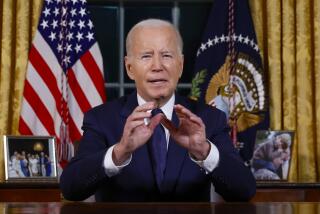Is Domestic Policy a Casualty of War? : No money, few ideas, insufficient effort
- Share via
It is surely asking a bit much to expect the President of the United States to lay out a comprehensive domestic program in the middle of a war.
But it is also absurd to expect that the long-range security of the United States won’t be harmed without one. America faces serious problems at home, and over the months and years to come, the enemies within our borders could threaten democracy as much as any threat abroad.
These enemies are far too numerous, not to mention obvious, to enumerate. Few domestic problems, if any, appear to be abating; most appear to be worsening at an alarming rate. In his State of the Union speech Tuesday night, the President in passing did touch on some key domestic issues, including a troubled education system and the need for an energy policy. He then promised that more detail was coming.
Perhaps under the highly emotional circumstances of that moment, that approach was the wisest course. Had he spent less time addressing himself to the war and his concerns for this nation’s fighting men and women, he might have invited criticism of a different sort.
THE BACKDROP: Even so, the President’s relative inattention to domestic-policy detail came amid a backdrop of a two-year track record of such inattentiveness. Now, even some of his own political advisers are increasingly concerned about the GOP’s vulnerability to a Democratic domestic-policy attack in 1992. Time magazine’s year-end “Men of the Year” cover on George Bush sought to capture the President’s contrasting images: confident in foreign policy, shaky on the domestic platform.
To be sure, the Democrats have hardly been a ball of fire on domestic policy. The official Demoratic reply to the State of the Union by Senate Majority Leader George Mitchell was vague in its own way. The problem is that with so little money to go around, the usual approach of concocting a new program and then funding it won’t work. All funds are spoken for.
THE IMPASSE: This puts the Democrats into the uncomfortable position of having to be genuinely creative. How do you solve domestic problems without money? Or how do you create the political will to spend money on domestic problems--or to reorder priorities to use whatever money we have to better effect? That’s the billion-dollar question for any Democrat planning to become President. So far, therefore, it’s a draw: The Republicans have few real ideas and neither do the Democrats. That impasse is at the core of the current sterility of debate on U.S. domestic policy.
The President gets another opportunity to fashion himself a more impressive domestic platform when the annual domestic-policy statement is issued this month. And the Democrats will get a chance to advance their own position. But a sullen sense of defeatism and lack of intellectual energy pervades Washington. It could well be that serious thinking about domestic problems will become a casualty of this war, at least for as long as it is being waged. That needn’t, and shouldn’t, be.
More to Read
Get the L.A. Times Politics newsletter
Deeply reported insights into legislation, politics and policy from Sacramento, Washington and beyond. In your inbox twice per week.
You may occasionally receive promotional content from the Los Angeles Times.










